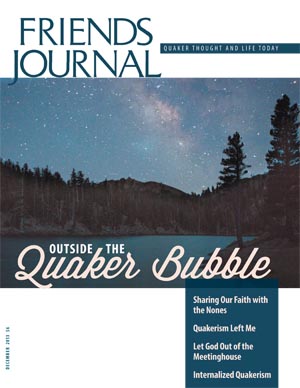Use the media player above or right-click here to download an audio version of this article.
 Those familiar with oppression theory know that it assumes that all people, even from privileged groups, internalize beliefs that are held about their group and also patterns of behavior that are common within their group. I’m writing this article as someone who was raised Quaker, grappling with what I see to be my “internalized Quakerism”―both the good and the bad of that. My ex-partner met me when he was 33, and he said I got his attention because he’d never met anyone who’d actually been raised as a pacifist, learning about the values of equality, simplicity, and integrity from an early age. Everyone else he knew in the peace movement had made their way to finding these things later in life. “It was just sort of knit into you,” he said. It is, and I’m glad of that; my joke to people is: “I chose Quaker parents to save myself the time and trouble of finding Quakerism.”
Those familiar with oppression theory know that it assumes that all people, even from privileged groups, internalize beliefs that are held about their group and also patterns of behavior that are common within their group. I’m writing this article as someone who was raised Quaker, grappling with what I see to be my “internalized Quakerism”―both the good and the bad of that. My ex-partner met me when he was 33, and he said I got his attention because he’d never met anyone who’d actually been raised as a pacifist, learning about the values of equality, simplicity, and integrity from an early age. Everyone else he knew in the peace movement had made their way to finding these things later in life. “It was just sort of knit into you,” he said. It is, and I’m glad of that; my joke to people is: “I chose Quaker parents to save myself the time and trouble of finding Quakerism.”
However, over the years, I’ve come to realize that looking at the world solely through a Quaker lens can create views that are, well, at minimum “different” and that some might say have a downside. One example is that I was raised with the idea that there is “that of God” in everyone, and I was urged to look for it; but nothing was said about being aware of “that not of God” in others. I have learned, partly the hard way, to recognize that people can make choices motivated by ego, vanity, pride, greed, rage, jealousy, and hatred. These choice are not of God; they represent a turning away from God. I absolutely believe in redemption, that no one is beyond returning to God’s love and God’s healing and direction—forgiveness, if you will.
However, a belief in redemption does not really provide guidance for anticipating that others will, sometimes predictably, choose, or otherwise be impelled, to act out of that which is not God. I wish my Quaker parents had provided such guidance before adulthood (and thus I write this partially for all readers who are parenting Quaker children). I wish I’d been told, “Look for that of God in others. Also notice whether they stay close to God or stray. Invite forth that of God in them always, but don’t deny the truth, or sugar coat it in yourself. Ask the Provider’s guidance and protection when you face that which is unfaithful in others.” I think I would have less wear-and-tear marks on me if I’d been told that.
On a happier note of internalized Quakerism, I’ve realized that a sense of political potential or empowerment is something I get from Quakerism. Being an activist, I see how few of my fellow citizens have this sense of efficacy. Going in and out of Quaker business meetings all my life has taught me the following lessons: (1) We can make decisions―even important ones. (2) It is your duty to have a voice and speak the truth. (3) You can make things change even as only one person. These are powerful, profound messages! Think about what it is like to function in other areas of your life (your workplace, your neighborhood, your relationships) and to believe that it is possible to change things. That sense of possibility is, I think, one of the gifts of decades lived inside Quakerism.
Because the Quaker values of peace, justice, equality, and the like are congruent with American Liberalism, another internalized trait of being Quaker is a fairly unexamined liberal bent. There is a permeable membrane where perhaps there should not be one. Ideas, campaigns, and norms from American Liberalism enter into our thinking and our awareness somewhat under analyzed, with little consideration of whether they come from, or belong with, the life of the Spirit. An example is the common assumption that we will have, or perhaps even feel entitled to, a typical American lifestyle: a college education, a job, a home, etc. Such a liberal belief in modern Quakerism may actually stand in the way of perceiving or being faithful to calls for Holy Obedience that would bring us into conflict with the authorities and threaten such a lifestyle.
American Liberalism, if substituted uncritically for Quaker values, would also argue for a form of tolerance and permissiveness that would make no demands of our fellow members. It adopts an almost co-dependent posture in which literally anything goes and we must accept any mentally ill behavior or religious belief regardless of its non-Quaker nature. We disregard any violation of our actual value set―all in deference to the liberal norm of acceptance of all. Lost is the sense that we are a gathered and faithful people, called by God and asked by God to stand for certain values, to wrestle in love with those who act outside of that which God asks.
Perhaps the most important aspect of internalized Quakerism for me has been my internalized expectations of Quaker process, especially in encounter with others, and the often disappointing results that follow. It has taken me years to recognize that when a decision needs to be made involving another (partner, friend, co-worker), I straightforwardly state my opinion or idea and then sit back, waiting to hear other ideas, opinions, or at least reactions. I have been fooled many a time by apparent agreement with my ideas or mistaken willingness to adopt my thoughts without discussion. Imagine my surprise when later, I’m informed that I had been “opinionated” or perceived as arbitrary, with a take-charge disposition. In my defense, I have taken to trying to warn my non-Quaker peers ahead of time that my statements of opinions should not be seen as coups d’état, but this warning has not been particularly useful. My surprise has also run the other direction when I have entered a group assuming that all opinions are welcomed or desired, only to find out that decisions would be made elsewhere and not inclusively!
I’ve also noticed that this internalized expectation for following Quaker process has deeply and permanently impacted my leadership style. I never assume that I will make the decisions or dictate what will happen. I have no solo-leader model, only a facilitator model―a facilitator so bound to group, that without group nothing happens. In any group setting, I naturally (whether leader or not) seek to elicit others’ opinions, looking for what I can hold up and affirm in what others say, and with a goal to bring the group into unity. How great, you say! Well, yes and no. It is great for the feelings of individual group members. But for groups unfamiliar with this process, unaccustomed to having their opinions sought, or untrained in how to bring differing opinions into unity, this approach can seem bewildering, scary, or, at worst, a huge waste of time. The democracy model with which most are familiar demands a majority vote and then on to the next thing. Thus, those who look to me (or to other Quakers) for leadership in the wide world may actually be frustrated by our ponderous process. As evident in some of the more frustrating situations I’ve been in, the Quaker style may simply be pushed aside in favor of more traditional top-down leadership.
It has taken me more than 50 years to consider that if I want to be effective in the world outside of Quakers, then perhaps I need to be more individually decisive. I may need to learn to lead by example, to claim my ideas, to persuade when necessary. Yet still, I ask, “How can I empower those who’ve never been empowered to make decisions to be a part of the process themselves?”
Recently, I was with a friend who has been Quaker for about four decades, and we were looking at her astrological chart. We giggled together about how Quakerism has softened or blunted her inborn tendency to blurt things out, to grab the ball and run down the court with it, to ignore others’ opinions. So certainly internalized Quakerism looks very good on many of us. What about you? How have you internalized Quakerism?



Fabulous article – I have experienced all of this, even as a convinced Friend. One addition I would offer is that this expectation of Quaker process and that-of-God perspective isn’t always the case even within Quaker meetings and circles. That is where we may be most blind-sided – and most hurt – expecting more of Friends or Meetings than they may be able to give.